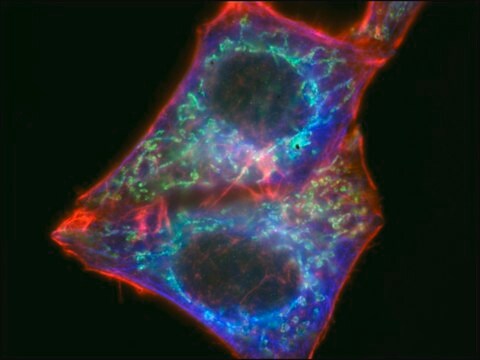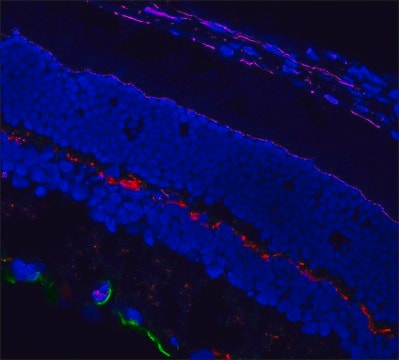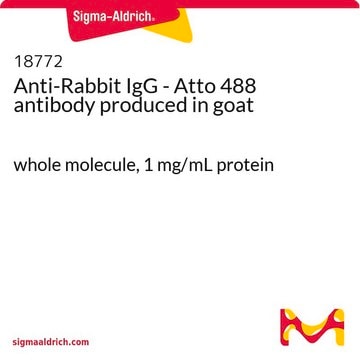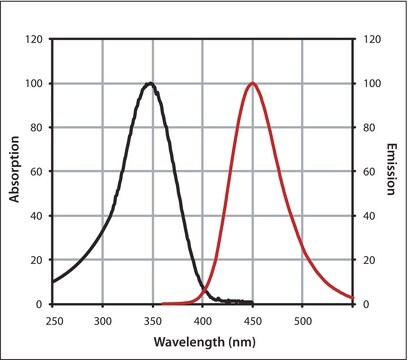General description
CF647 F(ab′)2 fragment of goat anti-mouse IgG is affinity-purified F(ab′)2 fragment of goat anti-mouse IgG labeled with a red fluorescent dye CF647, one of an outstanding series of CF dyes developed by Biotium. CF dyes are superior to both Alexa Fluor dyes and Cy dyes for antibody labeling by having combined advantages in brightness, photostability, and specificity.
IgG (immunoglobulin G) antibody is abundantly present in mother′s milk and is secreted by B cells. IgG contributes to 10−20% of plasma protein and is regarded as one of the most predominant serum protein. It consists of four subclasses : IgG1, IgG2, IgG3 and IgG4. The IgG structure possesses four polypeptide chains containing two identical γ heavy (H) chains and two identical κ or λ light (L) chains of 50kDa and 25kDa respectively. Limited digestion using papain cleaves the antibody into three fragments, two of which are identical and contain the antigen-binding activity. They are known as fragment antigen binding (Fab) fragments. These fragments contain the light chains paired with the VH and CH1 domains of the heavy chains. The variable region of IgG antibody is specific to antigens and is highly conserved.
Specificity
Binds with whole molecule rabbit IgG and the light chains of other rabbit immunoglobulins.
Immunogen
rabbit IgG (H+L)
Biochem/physiol Actions
IgG (immunoglobulin G) antibody provides protection against bacterial, fungal and viral infections. Maternal IgG is transferred to fetus through the placenta that is vital for the immune defense of the neonate against infections. IgG antibody has its function similar to IgM antibody in complement system activation. IgG is involved in hypersensitivity type II and type III. It helps in opsonization, complement fixation and cell-mediated cytotoxicity.
Features and Benefits
Evaluate our antibodies with complete peace of mind. If the antibody does not perform in your application, we will issue a full credit or replacement antibody.
Learn more.Physical form
Supplied in phosphate buffered saline with 0.05% sodium azide, 50% glycerol and 0.2% BSA.
Preparation Note
Protect from light. The antibody solution should be gently mixed before use.
Legal Information
This product is distributed by Sigma-Aldrich Co. under the authorization of Biotium, Inc. This product is covered by one or more US patents and corresponding patent claims outside the US patents or pending applications owned or licensed by Biotium, Inc. including without limitation: 12/334,387; 12/607,915; 12/699,778; 12/850,578; 61/454,484. In consideration of the purchase price paid by the buyer, the buyer is hereby granted a limited, non-exclusive, non-transferable license to use only the purchased amount of the product solely for the buyer′s own internal research in a manner consistent with the accompanying product literature. Except as expressly granted herein, the sale of this product does not grant to or convey upon the buyer any license, expressly, by implication or estoppel, under any patent right or other intellectual property right of Biotium, Inc. Buyer shall not resell or transfer this product to any third party, or use the product for any commercial purposes, including without limitation, any diagnostic, therapeutic or prophylactic uses. This product is for research use only. Any other uses, including diagnostic uses, require a separate license from Biotium, Inc. For information on purchasing a license to use this product for purposes other than research, contact Biotium, Inc., 3159 Corporate Place, Hayward, CA 94545, Tel: (510) 265-1027. Fax: (510) 265-1352. Email: btinfo@biotium.com.
CF is a trademark of Biotium, Inc.
Disclaimer
Unless otherwise stated in our catalog or other company documentation accompanying the product(s), our products are intended for research use only and are not to be used for any other purpose, which includes but is not limited to, unauthorized commercial uses, in vitro diagnostic uses, ex vivo or in vivo therapeutic uses or any type of consumption or application to humans or animals.






